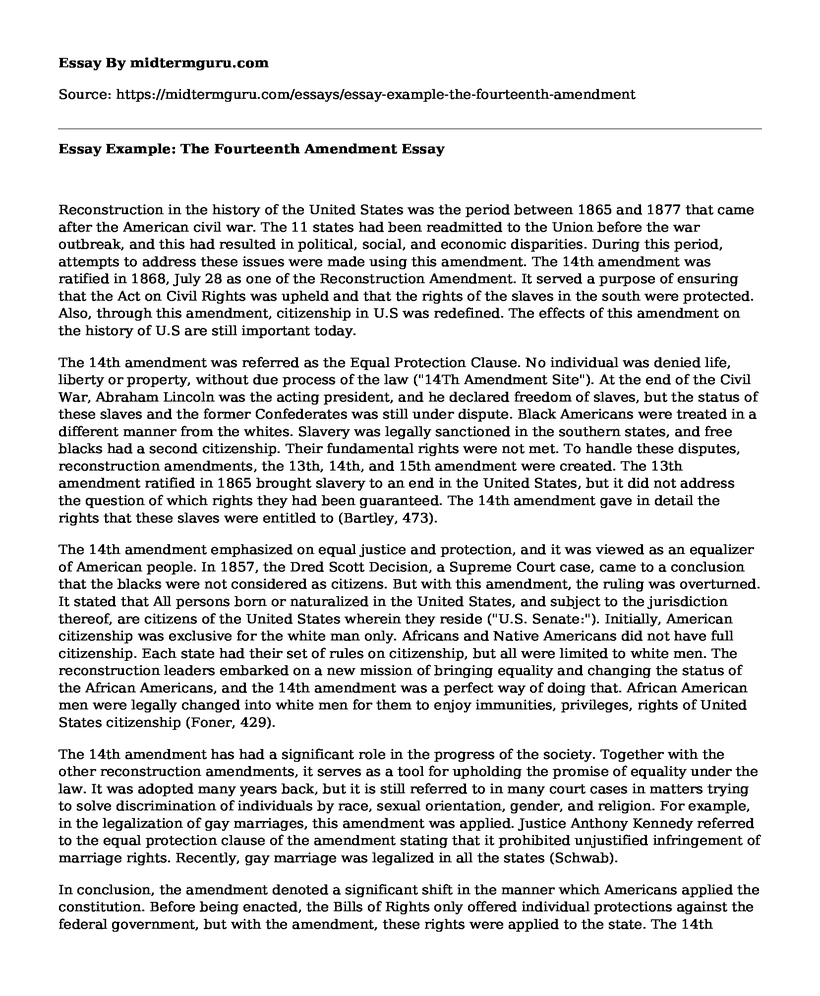Reconstruction in the history of the United States was the period between 1865 and 1877 that came after the American civil war. The 11 states had been readmitted to the Union before the war outbreak, and this had resulted in political, social, and economic disparities. During this period, attempts to address these issues were made using this amendment. The 14th amendment was ratified in 1868, July 28 as one of the Reconstruction Amendment. It served a purpose of ensuring that the Act on Civil Rights was upheld and that the rights of the slaves in the south were protected. Also, through this amendment, citizenship in U.S was redefined. The effects of this amendment on the history of U.S are still important today.
The 14th amendment was referred as the Equal Protection Clause. No individual was denied life, liberty or property, without due process of the law ("14Th Amendment Site"). At the end of the Civil War, Abraham Lincoln was the acting president, and he declared freedom of slaves, but the status of these slaves and the former Confederates was still under dispute. Black Americans were treated in a different manner from the whites. Slavery was legally sanctioned in the southern states, and free blacks had a second citizenship. Their fundamental rights were not met. To handle these disputes, reconstruction amendments, the 13th, 14th, and 15th amendment were created. The 13th amendment ratified in 1865 brought slavery to an end in the United States, but it did not address the question of which rights they had been guaranteed. The 14th amendment gave in detail the rights that these slaves were entitled to (Bartley, 473).
The 14th amendment emphasized on equal justice and protection, and it was viewed as an equalizer of American people. In 1857, the Dred Scott Decision, a Supreme Court case, came to a conclusion that the blacks were not considered as citizens. But with this amendment, the ruling was overturned. It stated that All persons born or naturalized in the United States, and subject to the jurisdiction thereof, are citizens of the United States wherein they reside ("U.S. Senate:"). Initially, American citizenship was exclusive for the white man only. Africans and Native Americans did not have full citizenship. Each state had their set of rules on citizenship, but all were limited to white men. The reconstruction leaders embarked on a new mission of bringing equality and changing the status of the African Americans, and the 14th amendment was a perfect way of doing that. African American men were legally changed into white men for them to enjoy immunities, privileges, rights of United States citizenship (Foner, 429).
The 14th amendment has had a significant role in the progress of the society. Together with the other reconstruction amendments, it serves as a tool for upholding the promise of equality under the law. It was adopted many years back, but it is still referred to in many court cases in matters trying to solve discrimination of individuals by race, sexual orientation, gender, and religion. For example, in the legalization of gay marriages, this amendment was applied. Justice Anthony Kennedy referred to the equal protection clause of the amendment stating that it prohibited unjustified infringement of marriage rights. Recently, gay marriage was legalized in all the states (Schwab).
In conclusion, the amendment denoted a significant shift in the manner which Americans applied the constitution. Before being enacted, the Bills of Rights only offered individual protections against the federal government, but with the amendment, these rights were applied to the state. The 14th amendment was significantly important during the Civil Rights Movement from 1955-1968. Additionally, after the civil war, the confederacy was brought back to the U.S through this amendment. It further addresses the issue of slavery by nullifying debts resulting from slaves emancipation. Its importance to civil rights is also apparent, and violation of this right under this amendment will result in civil damages in a lawsuit.
Works Cited
Bartley, Abel A. "The Fourteenth Amendment: The Great Equalizer of the American People." Akron L. Rev. 36 (2002): 473.
Foner, Eric. "The Original Intent of the Fourteenth Amendment: A Conversation with Eric Foner." Nev. LJ 6 (2005): 425.
"14Th Amendment Site". 14thamendment.harpweek.com. N.p., 2017. Web. 29 Jan. 2017.
"Fourteenth Amendment And Citizenship | Law Library Of Congress". Loc.gov. N.p., 2017. Web. 29 Jan. 2017.
Schwab, Nikki. "HereS Why The 14Th Amendment Is A Big Deal". www.usnews.com. N.p., 2017. Web. 29 Jan. 2017.
"U.S. Senate:". Senate.gov. N.p., 2017. Web. 29 Jan. 2017.
Cite this page
Essay Example: The Fourteenth Amendment. (2021, May 31). Retrieved from https://midtermguru.com/essays/essay-example-the-fourteenth-amendment
If you are the original author of this essay and no longer wish to have it published on the midtermguru.com website, please click below to request its removal:
- Book Review: Flapper by Joshua Zeitz
- Essay on Introduction of Federal Court System
- Essay on the Art of the First Cities: Mesopotamia
- The Long Death of Slavery in the United States - History Essay Example
- The Climactic Battle of World War II - Essay Example
- Paper Example on Modern Policing
- Domestic Violence: Case Analysis







